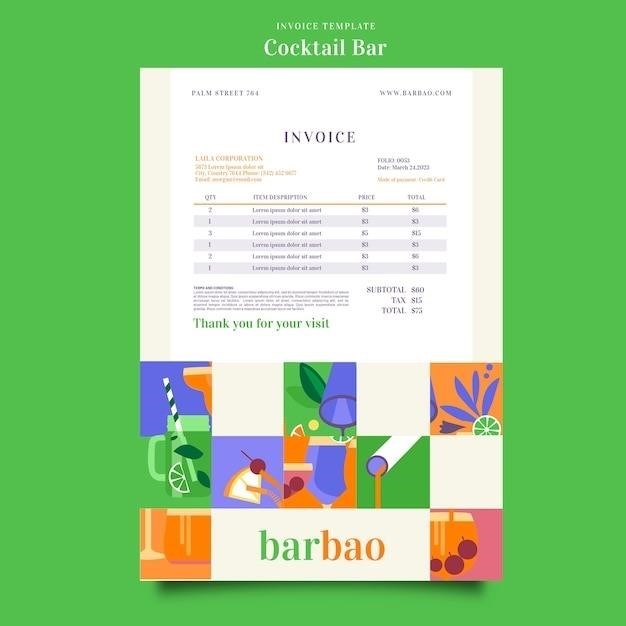
Bartender Test Questions and Answers PDF⁚ A Comprehensive Guide
Ace your bartending exam with our comprehensive PDF guide! Packed with essential knowledge, cocktail recipes, bar tool information, liquor details, and customer service tips, this resource ensures success. Prepare thoroughly for both written and practical assessments. Download now!
I. Essential Bartending Knowledge
This section covers fundamental bartending principles. Mastering these concepts is crucial for success. Key areas include understanding different types of alcohol (spirits, liqueurs, wines, beers), their flavor profiles, and appropriate serving temperatures. Learn about standard drink measurements (using jiggers and other tools) and the importance of accurate pouring techniques. Familiarize yourself with common bar terminology (e.g., “well,” “call,” “premium”). Understanding the legal aspects of alcohol service, including responsible alcohol service and age verification procedures, is paramount. This section will also cover proper hygiene and sanitation practices in a bar environment, ensuring a safe and clean workspace for both staff and patrons. Finally, efficient bar setup and organization are essential to smooth operations and quick service.
II. Cocktail Recipes and Techniques
This section delves into the art of mixology. Learn classic cocktail recipes, including variations and modern twists. Master fundamental techniques such as shaking, stirring, muddling, and layering. Understand the importance of proper ingredient ratios and their impact on the final product’s taste and presentation. Explore different types of glassware and their appropriate uses for various cocktails. Develop your skills in creating balanced and flavorful drinks, considering factors like sweetness, sourness, bitterness, and strength. Practice garnishing techniques to enhance the visual appeal of your creations. This section also covers understanding flavor profiles and how different ingredients complement each other. Explore both simple and complex cocktail constructions, building a solid foundation for creating a wide range of drinks. Finally, learn about common mistakes to avoid and tips for improving your speed and efficiency.
III. Bar Tools and Equipment
This section focuses on the essential tools and equipment every bartender should know. We cover the functionality and proper use of jiggers for precise measurements, shakers for chilling and mixing, strainers for removing ice and pulp, muddlers for crushing ingredients, and bar spoons for stirring. Learn about different types of glassware, such as highball glasses, rocks glasses, martini glasses, and coupe glasses, and when to use each one. Understand the importance of proper ice handling and the different types of ice used in cocktails. Explore specialized tools like Hawthorne strainers, julep strainers, and Boston shakers. Learn about the benefits of using quality tools and how they impact the overall drink preparation process. We also cover the importance of maintaining cleanliness and hygiene standards when handling bar tools and equipment. Proper cleaning and storage techniques are detailed to ensure the longevity and hygiene of your equipment. Finally, we discuss efficient bar setup and organization for smooth and fast service.
IV. Liquor Knowledge⁚ Types and Brands
This section delves into the world of spirits, covering various types and prominent brands. We explore the differences between various spirits such as vodka, gin, rum, tequila, whiskey (including bourbon, Scotch, Irish, and rye), and liqueurs. Understand the production processes, flavor profiles, and common brands associated with each spirit category. Learn to distinguish between well, premium, and top-shelf liquors, understanding the factors that contribute to price differences. Explore the characteristics of different types of mixers, including juices, sodas, and bitters, and how they complement various spirits. We also discuss the importance of responsible alcohol service and the legal aspects related to serving alcohol. Learn to identify fake IDs and how to refuse service to intoxicated patrons. The section also includes a glossary of terms commonly used in the liquor industry, ensuring a comprehensive understanding of spirits and their nuances. Finally, we cover the importance of storing liquor properly to maintain its quality and flavor.
V. Customer Service and Interaction
Exceptional customer service is paramount for a successful bartender. This section covers essential skills in handling customer interactions, from greeting and seating patrons to taking orders and addressing complaints. Learn effective communication techniques, including active listening and clear articulation. Master the art of suggestive selling, upselling techniques, and recommending appropriate drinks based on customer preferences. We also cover conflict resolution strategies, handling difficult customers, and de-escalating tense situations professionally. Understand the importance of maintaining a friendly and welcoming atmosphere, creating a positive experience for each guest. Learn to manage customer expectations, handle rush periods efficiently, and maintain a professional demeanor under pressure. The section also includes best practices for handling payments, providing accurate change, and following responsible alcohol service guidelines. Additionally, learn how to manage different customer personalities, anticipate their needs, and offer personalized service.

Bartender Interview Questions and Answers
This section provides sample interview questions and effective answer strategies for aspiring bartenders. Prepare for common questions about experience, problem-solving, legal knowledge, teamwork, and career goals. Boost your interview confidence and land your dream job!
VI. Experience and Background
This section delves into questions focusing on your past bartending experiences and overall background. Prepare to discuss previous roles, highlighting achievements and responsibilities. Quantify your accomplishments whenever possible; for example, instead of saying “I managed a busy bar,” try “I managed a bar with an average of 100 customers per night, consistently exceeding sales targets by 15%.” Be ready to explain any gaps in your employment history honestly and concisely. Showcase your adaptability by providing examples of how you handled different bar environments and customer demands. Emphasize any training or certifications you’ve completed, such as mixology courses or responsible alcohol service programs. Remember to connect your past experiences to the specific requirements of the job you’re applying for, demonstrating a clear understanding of the role and its expectations. Thoroughly prepare specific examples to showcase your skills and experience, making your responses memorable and impactful.
VII. Problem-Solving and Conflict Resolution
This section assesses your ability to handle challenging situations and resolve conflicts effectively. Expect questions on how you’ve dealt with difficult customers, intoxicated patrons, or staff disagreements. Prepare specific examples demonstrating your problem-solving skills. Use the STAR method (Situation, Task, Action, Result) to structure your answers, clearly outlining the situation, your assigned task, the actions you took, and the positive outcome. Highlight your ability to remain calm under pressure and de-escalate tense situations. Emphasize your communication skills and ability to find mutually agreeable solutions. For instance, describe how you handled a customer complaint, highlighting your active listening skills and ability to offer a satisfactory resolution. Showcase your resourcefulness and initiative in finding creative solutions to unexpected challenges. Demonstrate your understanding of responsible alcohol service and your commitment to maintaining a safe and positive bar environment for all.
VIII. Legal and Safety Regulations
This section focuses on your understanding of and adherence to relevant laws and safety procedures. Expect questions regarding legal drinking ages, responsible alcohol service, identification verification, and the prevention of underage drinking. Be prepared to discuss your knowledge of alcohol-related laws in your jurisdiction, including penalties for non-compliance. Demonstrate your understanding of safe liquor handling and storage practices, including proper temperature control and prevention of spills or contamination. Show familiarity with procedures for handling intoxicated patrons, including refusing service and contacting appropriate authorities when necessary. Highlight your awareness of workplace safety regulations and emergency procedures. You might be asked about blood alcohol content (BAC) levels and their implications. Emphasize your commitment to creating a safe environment for both staff and patrons by strictly adhering to all relevant laws and regulations.
IX. Teamwork and Communication Skills
Effective teamwork and clear communication are crucial in a high-pressure bar environment. Interviewers will assess your ability to collaborate with colleagues, handle multiple tasks simultaneously, and maintain a positive working relationship. Be prepared to discuss examples of successful teamwork from your previous experience. Highlight instances where you effectively communicated with colleagues, supervisors, and customers. Emphasize your ability to work efficiently under pressure, manage stress, and adapt to changing situations. Demonstrate your active listening skills and ability to resolve conflicts constructively. Show how you contribute positively to a team environment and maintain professionalism even during busy periods. Prepare specific examples illustrating your communication skills, including handling difficult customers or resolving workplace disagreements. Your ability to communicate clearly and effectively is vital for success as a bartender.
X. Career Goals and Aspirations
Articulating your career goals and aspirations demonstrates ambition and foresight to potential employers. Instead of simply stating a desire for a bartending position, showcase your long-term vision within the hospitality industry. Discuss your interest in specific areas like mixology, management, or advanced bartending techniques. Explain how this role aligns with your career path and what skills you hope to develop. Express a genuine enthusiasm for the establishment and its atmosphere. Mention any specific goals you have for your professional development, such as attending advanced mixology workshops or pursuing certifications. Showcase your commitment to continuous learning and improvement. Highlight your ambition to grow within the company and your willingness to take on increased responsibilities. Demonstrate a thoughtful approach to your career trajectory beyond the immediate position. This demonstrates a proactive and ambitious attitude, which is highly valued by employers.